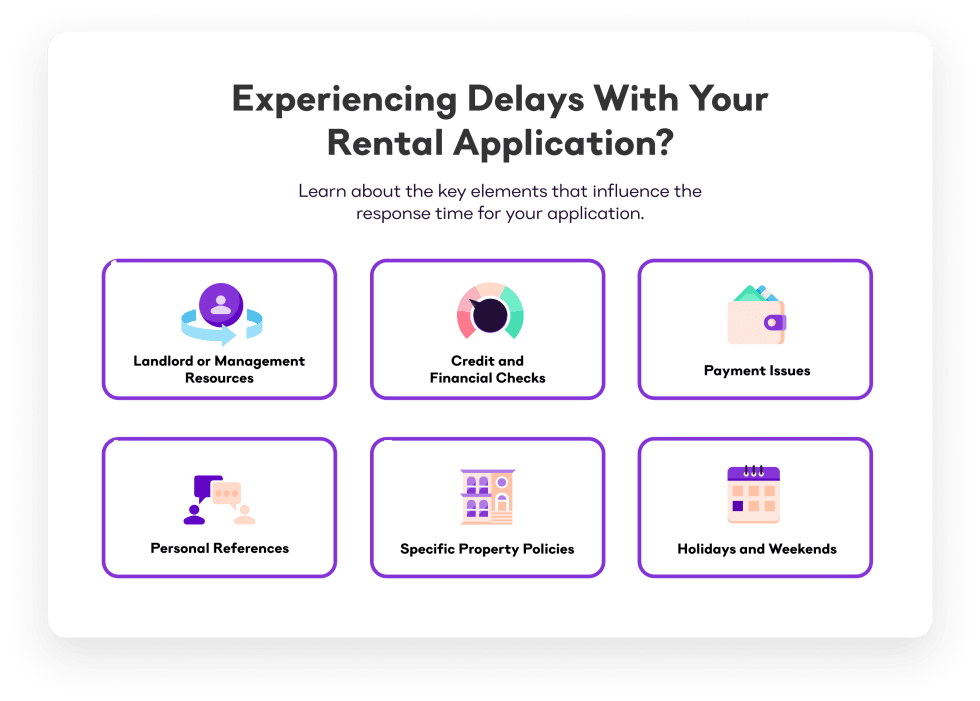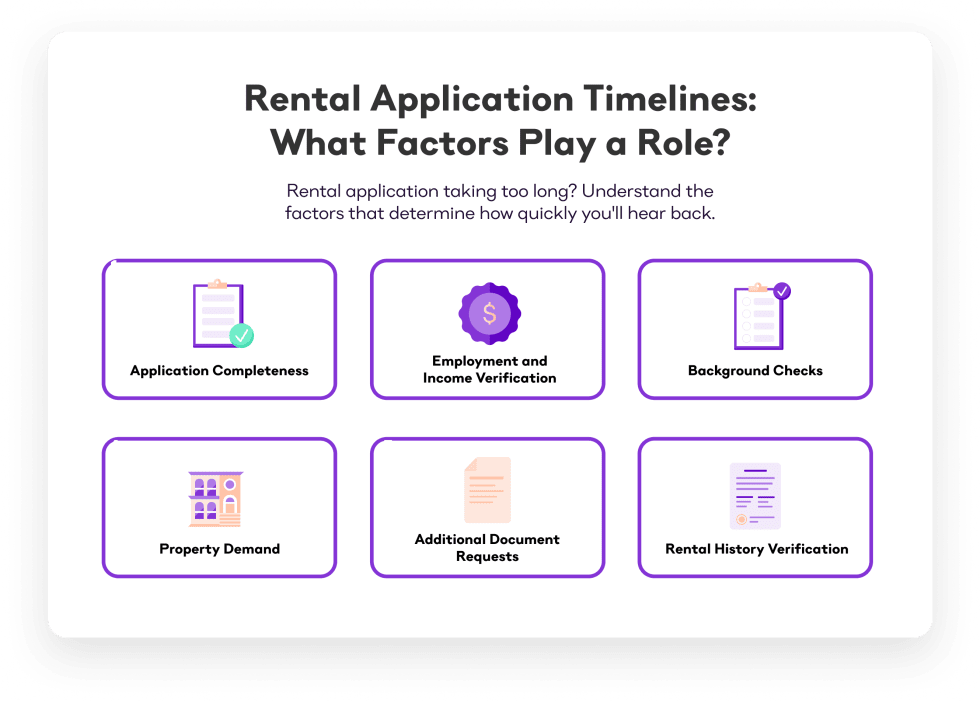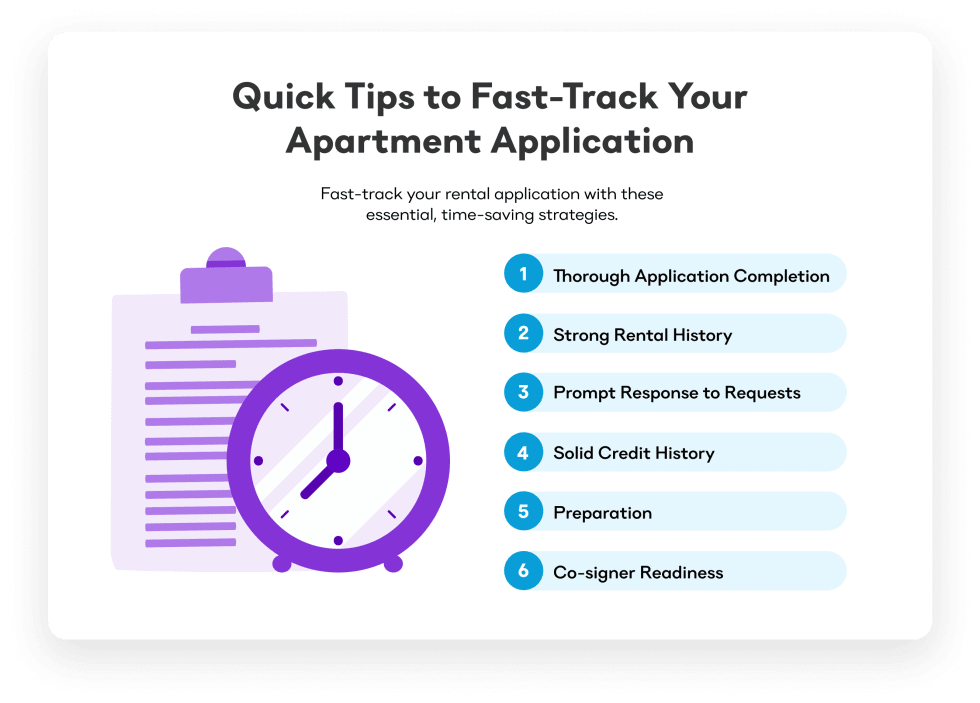- 47 units available
- 1 bed • 2 bed • 3 bed
- Amenities
In unit laundry, Hardwood floors, Dishwasher, 24hr maintenance, Stainless steel, Walk in closets + more

Most rental applications are approved in 24 to 72 hours, but delays can extend the process to a week or more.
It's important to have a clear understanding of the apartment application process, as it sets the pace for your moving plans and helps set realistic expectations. Whether it's your first time renting or if you're a seasoned pro, these insights will help streamline your move into your new abode.
In this guide, we’ll be diving into the essential aspects of apartment hunting, focusing on one of the most common queries: the approval timeline.
Here are 12 key factors that can influence how quickly you receive approval for your new apartment.
You have to submit a complete application, because an application that is missing crucial details or documents can significantly delay the approval process. Some landlords and property managers even prioritize applications that are thorough and accurately filled out.
This means ensuring that every field is completed and that all necessary documents, such as proof of income, identification, and references, are included. A complete application not only speeds up the review process but also showcases your responsibility as a potential tenant, making a positive impression right from the start.
In the initial application, provide clear proof of income and employment history. Landlords and property managers often require proof of stable income to ensure tenants can afford the rent. This typically involves providing recent pay stubs, tax returns, or employer letters.
The verification process can take time, especially if your employer is slow to respond or if you're self-employed. We recommend preparing these documents in advance and, if possible, offering direct contact information for your employer or accountant to expedite the verification.
Background checks are a standard part of most rental applications, encompassing credit history, criminal records, and past rental behavior. These checks can vary in duration depending on the thoroughness of the investigation and the response time of credit bureaus or other agencies involved.
It's crucial to be upfront about any potential issues that might arise in your background check. Landlords appreciate transparency and may be willing to discuss any concerns, rather than being caught off guard by surprises in the report.
A property that is in demand usually has more applications for landlords to review. In high-demand areas where many people are competing for the same apartment, landlords may take longer to review a larger pool of applicants.
Conversely, in less competitive markets, your application might be processed more quickly. Timing your application submission can be strategic; applying for an apartment in a less busy season, like late fall or early winter, may result in a faster response due to lower demand.
Requests for additional documents can add time to the approval process. Sometimes, landlords or property managers may need additional information to confirm your financial stability or rental history. This could include additional bank statements, rental references, or proof of assets.
Promptly providing these documents can help speed up the process. My advice is to anticipate these requests and have additional documentation ready, or quickly accessible, to help prevent delays.
Landlords often contact previous landlords to confirm your tenancy record and behavior, and this takes extra time. It can be a time-consuming step, especially if past landlords are slow to respond.
To expedite this process, inform your former landlords that they may receive a verification call or email. A positive rental history can significantly boost your application, so ensuring a smooth verification process is in your best interest.
The resources and efficiency of the landlord or property management company greatly affect application processing times. A landlord managing multiple properties or a company with limited staff might take longer to review applications.
On the other hand, a well-staffed management company or an individual landlord with fewer properties might process your application more swiftly. Taking the time to understand the management's structure and capabilities can give you a clearer expectation of the timeline.

Credit and financial checks are a standard part of the approval process, where landlords assess your financial reliability. This involves checking your credit score and history to evaluate your ability to pay rent on time. Delays may occur if there are financial discrepancies or issues that require clarification.
To help avoid potential delays, it’s wise to check your credit report beforehand and be prepared to discuss or explain any negative marks. Having a full understanding of your financial standing can help you address any concerns the landlord might have promptly.
Payment issues, like a security deposit not clearing, can cause delays in the application approval process. If your initial deposit or application fee encounters a problem, this can signal financial instability to the landlord.
To avoid such setbacks, ensure your bank account has sufficient funds and that all payment information is entered correctly. If a payment issue arises, addressing it swiftly and transparently can help maintain the landlord's confidence in your financial responsibility.
Providing personal references is a common requirement in rental applications, and the responsiveness of these references can influence the swiftness of your approval. Landlords often contact them to gain a better understanding of your reliability and character as a tenant.
It’s crucial to select references who can quickly and positively vouch for you. Inform them beforehand about the possibility of being contacted, so they’re prepared to respond swiftly and help expedite your application process.
Specific property policies set by landlords or management companies can vary widely, affecting how quickly your application is processed. Each property likely has its own set of rules and timelines for reviewing applications, conducting background checks, and verifying documents.
Ask about these procedures beforehand to get a clear picture of the expected timeframe. It's always beneficial to ask about these policies early in the application process to align your expectations with their procedures.
Submitting an apartment application on or around the holidays and weekends can extend the time it takes to be approved. Many property management offices operate with reduced hours or staff during these periods. This slowdown means that applications submitted right before or during holidays and weekends might face delays.
Timing your application submission to avoid these periods can result in a quicker response. Being aware of the management office's hours and planning your application submission accordingly can make a significant difference.

To secure the apartment of your dreams, it's crucial to submit a complete application. As soon as you've set your sights on a potential apartment, promptly request a rental application. This can be done through various channels, including directly at the leasing office, from the property manager, or online through the property's leasing website.
When filling out your application, accuracy and completeness are key. Include all essential information to present a comprehensive picture of your suitability as a tenant.
Your application should include:
Remember, most rental applications come with an application or processing fee. This fee varies by property and is usually necessary to cover the costs of background and credit checks. Be prepared for this fee, and paying it promptly can demonstrate your seriousness and financial readiness for the renting process.
Here are the top tips to accelerate the application process and help you secure your ideal home.
Completing your application thoroughly and accurately is the first step in speeding up the approval process. Ensure that every field is completed and that all necessary documents are attached. A complete application reduces the need for follow-up requests, which can significantly delay the process.
By double-checking for errors and omissions, you present yourself as a diligent and responsible applicant, making it easier for the landlord or property manager to process your application quickly.
Responding promptly to any requests from the landlord or property manager can greatly expedite your application process. Whether they request additional documents, clarification, or answers to specific questions, prompt responses demonstrate your enthusiasm and readiness for the apartment.
Keeping an eye on your email and phone, and preparing documents that you think they might request in advance, can help you respond more quickly and keep the process moving smoothly.
If you can, highlight a record of timely rent payments, proper care of previous rental properties, and positive relationships with past landlords. Include reference letters from previous landlords with your application, highlighting your reliability as a tenant. This proactive step can reassure new landlords of your trustworthiness, potentially speeding up their decision-making process.
A solid credit history is a critical factor in accelerating your apartment application process. Landlords often view a good credit score as a sign of financial responsibility, indicating you're likely to pay rent on time.
Before applying, check your credit report for any inaccuracies and address them. If your credit history is less than ideal, being upfront about it and providing a reasonable explanation, or showing proof of recent financial stability, can help alleviate any concerns the landlord may have.

Preparation is key to speeding up the apartment application process. This involves having all necessary documents ready before you begin searching for an apartment.
Gather your recent pay stubs, bank statements, a list of previous addresses, contact information for references, and any other documents landlords typically require. By having these items on hand, you can immediately respond when an application or additional information is requested, demonstrating your readiness to move forward quickly.
Having a co-signer ready can be a game-changer, especially if your credit history or income might not meet the landlord's requirements. A co-signer, typically a family member or close friend with a strong credit history, can provide the additional assurance a landlord needs to expedite your application.
Ensure your co-signer is informed and prepared to provide their financial information and undergo a credit check. This readiness can be particularly useful if you're a new renter, a student, or someone transitioning to a new job.
Leading with honesty when it comes to your rental and financial history, including any potential issues, can build trust with the landlord or property management. This openness allows for quicker resolution of any concerns they may have.
For example, if you have a blemish on your credit report or a gap in your rental history, providing a transparent explanation upfront can help prevent delays that might arise from the landlord discovering these issues later in the process.
Follow-ups can be an easy way to advance your application. If you haven't received a response within a reasonable time frame, it's perfectly acceptable to politely follow up with the landlord or property manager. This shows your interest and proactive approach.
Additionally, it can prompt them to prioritize your application among others. When following up, be respectful of their time and inquire about the status of your application in a friendly and professional manner.
Here's how to navigate a rejected apartment application:
Dear [Landlord/Property Manager],
I recently received notice that my application for [apartment address] was rejected. To better understand and improve my future applications, could you please provide the specific reasons for this decision? Thank you for your assistance.
Sincerely,
[Your Name]
Dear [Landlord/Property Manager],
After receiving the reasons for the rejection of my application for [apartment address], I believe there has been a misunderstanding or an error. [Explain your reasoning]. I kindly request a reconsideration of my application. Attached are documents supporting my case.
Thank you for re-evaluating my application.
Best regards,
[Your Name]
Ready to find your ideal apartment and streamline the approval process? Take our quiz now to find your perfect rental match and gain valuable insights for a smoother, quicker application process. Your dream apartment is just a click away!
Credit score requirements vary depending on the landlord and apartment complex. Generally, a credit score of 650 or higher is considered ideal for most rental properties. However, some landlords may accept lower scores with additional documentation, such as a co-signer or guarantor.
Landlords typically require applicants to have a gross income that is two to three times the monthly rent. This ensures you can comfortably afford the rent and other living expenses.
Application fees can vary, but typically range from $25 to $100. These fees cover the cost of processing your application, including credit checks and background checks. Some landlords may also charge additional fees for things like pet deposits or parking.
Having a bad credit score or eviction history doesn't necessarily disqualify you from renting an apartment. However, it will make it more challenging. Here are some things you can do to improve your chances:
Incomplete applications will instantly delay your application. Landlords or rental companies will need to contact you for additional information before they can proceed with processing your application.



In unit laundry, Hardwood floors, Dishwasher, 24hr maintenance, Stainless steel, Walk in closets + more
In unit laundry, Granite counters, Pet friendly, Stainless steel, Walk in closets, Gym + more